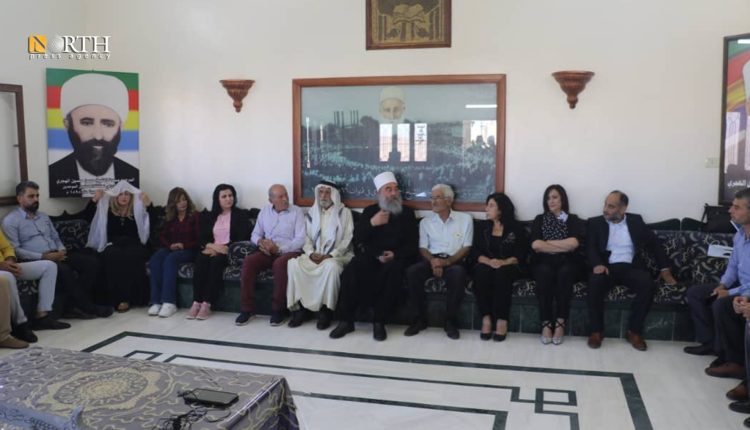SUWAYDA, Syria (North Press) – Recent comments by Sheikh Hikmat al-Hijri, the spiritual leader of the Druze community, advocating for decentralization in Syria have ignited a heated debate among political analysts. While some view decentralization as a practical framework for managing Syria’s diversity, others fear it could lead to fragmentation or inequality among regions.
Al-Hijri described decentralization as “the ideal solution for Syria” in a recent press statement, emphasizing the need for its inclusion in the constitution with input from all segments of society to create a civil state that embraces all Syrians.
Administrative vs. Political Decentralization
Nizar Abu Fakhr, former head of the Social Commission for National Action in Suwayda, clarified that al-Hijri’s comments likely referred to administrative, not political, decentralization.
“The difference is significant,” Abu Fakhr told North Press, adding that Suwayda and other Syrian regions suffered under the highly centralized governance of the previous regime, which stifled local development and incited social tensions.
He highlighted the security apparatus’s historical role in obstructing development projects and fostering discord to maintain centralized authority.
“Decentralized governance that allows for greater local participation in decision-making would be preferred by most Syrians,” Abu Fakhr argued. He suggested that the Local Administration Law No. 107, introduced by former Syrian President Bashar al-Assad, with amendments, could meet these aspirations.
The law ostensibly aims to decentralize power, enabling administrative units to develop and implement local development plans, enhance revenues, and increase community involvement. However, its implementation has been criticized for falling short of these goals.
A Historical and Practical Perspective
Haitham Saab, a researcher and political activist from Suwayda, supported al-Hijri’s vision, calling it “a wise reading of Syria’s historical and current realities.”
“Syria is a mosaic of ethnicities, religions, and sects,” Saab told North Press. “For a diverse society like ours, decentralization is the optimal governance model.”
He pointed out that some opposition to decentralization stems from a preference for centralized, authoritarian governance, which he believes is unsuitable for Syria’s diverse fabric.
“Centralized systems concentrate power over decision-making, finances, media, military, and even education and culture,” Saab said. “Decentralization offers a balanced distribution of decision-making authority, particularly in economic and developmental matters.”
Concerns About Fragmentation
Hossam al-Barm, a journalist and researcher based in France, expressed concerns about the broader implications of al-Hijri’s proposal.
“Decentralization as envisioned by Sheikh al-Hijri resembles a confederal system, which implies full autonomy and independence from the capital,” al-Barm said. “This approach is closer to separation than cooperation.”
Al-Barm argued that Suwayda’s push for decentralization might reflect a broader mistrust—not just in Damascus but in other Syrian communities as well. He accused external actors of supporting Suwayda’s aspirations as part of a “foreign agenda aimed at fostering separation.”
“This isn’t just about governance; it’s about obtaining privileges and concessions beyond those available to other regions,” he stated.
A Broader Debate
The discussion around decentralization highlights deeper divisions within Syrian society. For some, it represents a chance to empower marginalized regions and rebuild trust in governance. For others, it raises fears of further fragmenting a country already divided by years of war.
As Syria grapples with political, economic, and social crises, the debate over decentralization underscores the urgent need for governance models that reflect its diversity while maintaining national unity.
Whether decentralization can achieve this balance remains an open question, with profound implications for Syria’s future.

